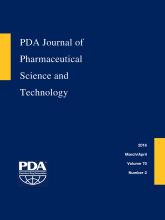Abstract
Sometimes, drug product for parenteral administration is stored in a frozen state (e.g., –20 °C or –80 °C), particularly during early stages of development of some biotech molecules in order to provide sufficient stability. Shipment of frozen product could potentially be performed in the frozen state, yet possibly at different temperatures, for example, using dry ice (–80 °C). Container closure systems of drug products usually consist of a glass vial, rubber stopper, and an aluminum crimped cap. In the frozen state, the glass transition temperature (Tg) of commonly used rubber stoppers is between –55 and –65 °C. Below their Tg, rubber stoppers are known to lose their elastic properties and become brittle, and thus potentially fail to maintain container closure integrity in the frozen state. Leaks during frozen temperature storage and transportation are likely to be transient, yet, can possibly risk container closure integrity and lead to microbial contamination. After thawing, the rubber stopper is supposed to re-seal the container closure system. Given the transient nature of the possible impact on container closure integrity in the frozen state, typical container closure integrity testing methods (used at room temperature conditions) are unable to evaluate and thus confirm container closure integrity in the frozen state. Here we present the development of a novel method (thermal physical container closure integrity) for direct assessment of container closure integrity by a physical method (physical container closure integrity) at frozen conditions, using a modified He leakage test. In this study, different container closure systems were evaluated with regard to physical container closure integrity in the frozen state to assess the suitability of vial/stopper combinations and were compared to a gas headspace method. In summary, the thermal physical container closure integrity He leakage method was more sensitive in detecting physical container closure integrity impact than gas headspace and aided identification of an unsuitable container closure system.
LAY ABSTRACT: Sometimes, drug product for parenteral administration is stored in a frozen state (e.g., –20 °C or –80 °C), particularly during early stages of development of some biotech molecules in order to provide sufficient stability. Container closure systems for drug products usually consist of a glass vial, rubber stopper, and an aluminum crimped cap. In the frozen state, the glass transition temperature (Tg) of commonly used rubber stoppers is between –55 and –65 °C. Leaks during frozen temperature storage and transportation are likely to be transient, yet they can possibly risk container closure integrity and lead to microbial contamination and sterility breach. After thawing, the rubber stopper is expected to re-seal the container closure system. Given the transient nature of the possible impact on container closure integrity in the frozen state, typical container closure integrity testing methods (used at room temperature conditions) are unable to evaluate and thus confirm container closure integrity in the frozen state. Here we present the development of a novel method (thermal container closure integrity) for direct measurement of container closure integrity by a physical method (physical container closure integrity) at frozen conditions, using a modified He leakage test. In this study, we found that the thermal container closure integrity He leakage method was more sensitive in detecting physical container closure integrity impact than gas headspace and aided identification of an unsuitable container closure system.
- Container closure integrity
- Frozen product
- Container closure system
- Vial
- Headspace analysis
- He leakage test
- © PDA, Inc. 2016
PDA members receive access to all articles published in the current year and previous volume year. Institutional subscribers received access to all content. Log in below to receive access to this article if you are either of these.
If you are neither or you are a PDA member trying to access an article outside of your membership license, then you must purchase access to this article (below). If you do not have a username or password for JPST, you will be required to create an account prior to purchasing.
Full issue PDFs are for PDA members only.
Note to pda.org users
The PDA and PDA bookstore websites (www.pda.org and www.pda.org/bookstore) are separate websites from the PDA JPST website. When you first join PDA, your initial UserID and Password are sent to HighWirePress to create your PDA JPST account. Subsequent UserrID and Password changes required at the PDA websites will not pass on to PDA JPST and vice versa. If you forget your PDA JPST UserID and/or Password, you can request help to retrieve UserID and reset Password below.






